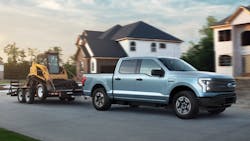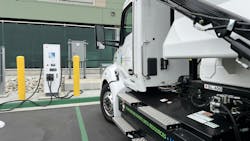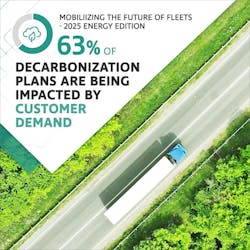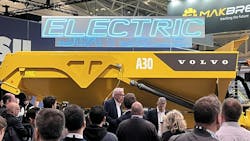More on sustainability
In this article, you will learn:
- What motivates fleets to switch to EVs.
- How sustainability factors into fleet investments.
- What alternative energies are available to fleets.
Where are we in the “energy transition” to electric and alternative fuel vehicles?
Will mandates rule the day? Will manufacturers force or spoon-feed change based on what’s most profitable for them?
At least one data set indicates that customer demand still rules.
Connected mobility company Teletrac Navman, always handy with surveys of its worldwide customer base, says 63% of fleets surveyed report that customer demand is influential in their decision to switch to alternative energies, and the speed at which they do it.
This is supported by over half (58%) of the businesses surveyed citing their own brand reputation and sustainability goals as the leading drivers in their energy transition, showing “Net Zero fluency” is far more weighted towards customer perception and demanded than it is a compliance priority.
Only 29% suggested regulatory pressure and government mandates was guiding their decision making.
“Fleets are focusing on their own net-zero goals as a part of their corporate reputation and long-term commercial strategies, rather than just seeing it as a compliance checkbox,” said Alain Samaha, Teletrac Navman’s CEO.
“Customers recognize the importance of sustainable operations, and according to our research, are making active decisions around the businesses they support based on their sustainability credentials,” he said.
It's a little like individual investors insisting their brokers direct them to sustainable companies.
The survey, called Mobilizing the Future of Fleets Report: 2025 Energy Edition, also reports that fleets are focused on getting the most fuel efficiency out of their current fleet make-ups.
Investing in fleet sustainability
Some 84% are working on operational improvements rather than considering new vehicle investments. Regular vehicle maintenance (49%), optimizing vehicle utilization (36%), and investing in driver training (28%) are some of the key areas of fleet investment cited by fleets.
Sixty one percent of fleets report they are making capex investments by upgrading to more fuel-efficient vehicles (48%) or switching to those using alternative fuels (31%), indicating an important focus on the type of vehicle being utilized and a longer-term approach being considered by businesses when reviewing and planning for their carbon reporting and impacts, Teletrac Navman says.
Naturally, larger fleets with more assets lead the way.
The larger the fleet (by number of vehicles), the more advanced the businesses were in their transition—62% of fleets with 50 or more assets indicated that they were already tackling their sustainability performance, with an active strategy to continue improving.
How fleets decide on acquisitions
Teletrac Navman’s survey uncovered a split on the fleets’ approach, with 46% indicating that they complete vehicle suitability assessments with the help of external consultancy (8%), while 42% preferred an end-of-life replacement approach.
Thirty percent of fleets had also completed a Total Cost of Ownership (TCO) analysis, “which is a crucial step to avoid costly mistakes in expenditure and vehicle choice further down the line,” Samaha says.
Teletrac Navman reports that 61% of fleets going to alternative energy said that they used more than one energy type, with 32% using three or more energy sources; plug-in hybrid EV (39%), battery-electric EV (37%), and natural gas (23%).
Notably, 8%,of fleets said they had already transitioned at least half of their fleets to these technologies, and 48% expect to reach the same milestone within the next two years, the survey said.
“The push for fleet sustainability is at a pivotal moment,” Samaha said. “There is no single viewpoint on the best path forward.”
This is echoed on the OEM off-road side, where the message has steered away from “Alternative energies will soon replace diesel” to “It will take a mix of fuels and technologies” to further reduce emissions and satisfy customer needs. Diesel remains very much alive.
At Bauma in Munich, OEMs pushed the mixed solution message. Volvo Construction Equipment and Hyundai, along with engine makers Deere Power Systems and Perkins, were among those stressing that alternative fuels and battery electric technology will not satisfy all applications anytime soon.
About the Author
Frank Raczon
Raczon’s writing career spans nearly 25 years, including magazine publishing and public relations work with some of the industry’s major equipment manufacturers. He has won numerous awards in his career, including nods from the Construction Writers Association, the Association of Equipment Manufacturers, and BtoB magazine. He is responsible for the magazine's Buying Files.




